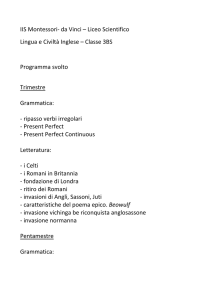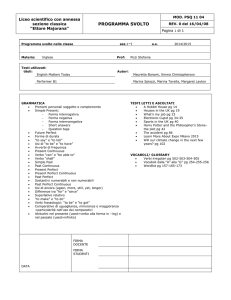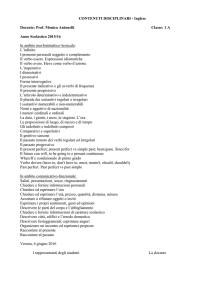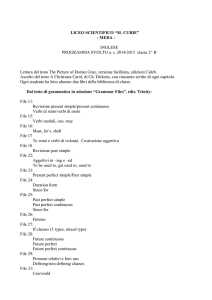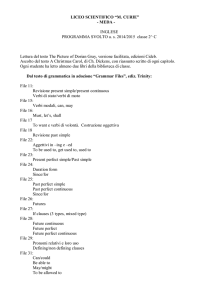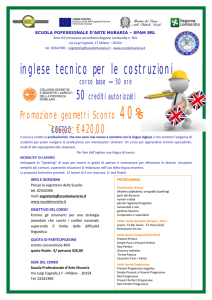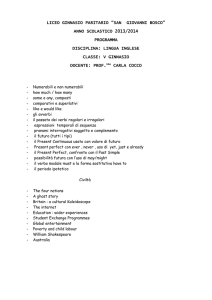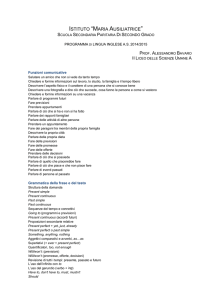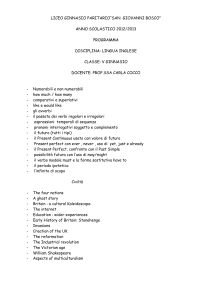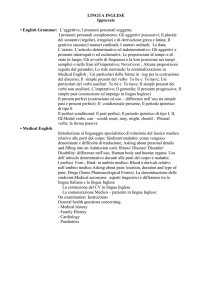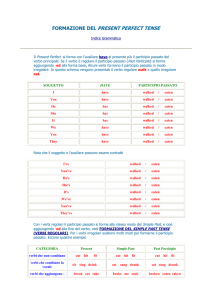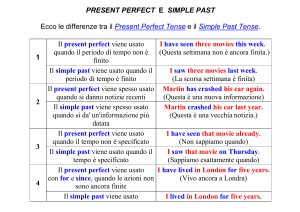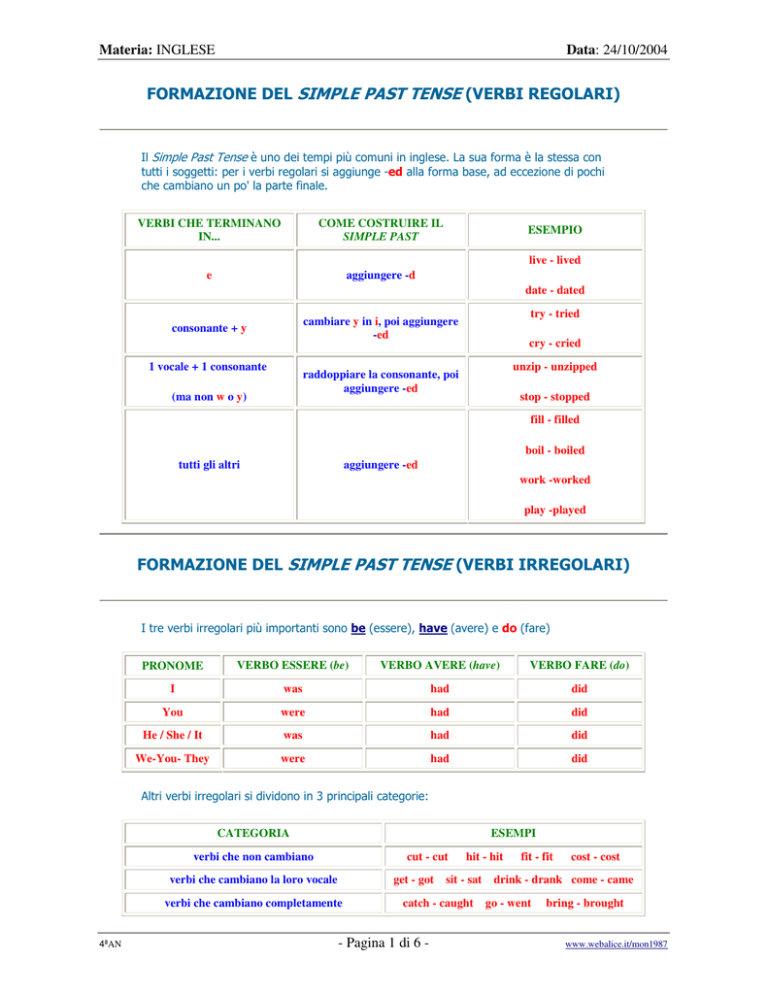
Materia: INGLESE
Data: 24/10/2004
!
VERBI CHE TERMINANO
IN...
COME COSTRUIRE IL
SIMPLE PAST
e
aggiungere -d
consonante + y
cambiare y in i, poi aggiungere
-ed
1 vocale + 1 consonante
ESEMPIO
live - lived
date - dated
try - tried
cry - cried
unzip - unzipped
raddoppiare la consonante, poi
aggiungere -ed
(ma non w o y)
stop - stopped
fill - filled
tutti gli altri
boil - boiled
aggiungere -ed
work -worked
play -played
"
#
"
#
#
PRONOME
VERBO ESSERE (be)
VERBO AVERE (have)
VERBO FARE (do)
I
was
had
did
You
were
had
did
He / She / It
was
had
did
We-You- They
were
had
did
$
%
CATEGORIA
ESEMPI
verbi che non cambiano
cut - cut
verbi che cambiano la loro vocale
get - got
verbi che cambiano completamente
4ªAN
"
hit - hit
sit - sat
catch - caught
- Pagina 1 di 6 -
fit - fit
cost - cost
drink - drank come - came
go - went
bring - brought
www.webalice.it/mon1987
Materia: INGLESE
Data: 24/10/2004
!
"
"
#
#
"
#
"
#
!
"
FRASE AFFERMATIVA
NEGATIVA INFORMALE
NEGATIVA FORMALE
I had a car
I didn't have a car
I did not have a car
You drank my beer
You didn't drink my beer
You did not drink my beer
He was here yesterday
He wasn't here yesterday
He was not here yesterday
They were in the park
They weren't in the park
They were not in the park
$
#
!
&
'!
FRASE AFFERMATIVA
FRASE INTERROGATIVA
He brought his friend
Did he bring his friend?
They had a party
Did they have a party?
You were here
Were you here?
She was sick
Was she sick?
# $ %& !
"'#
!"
#
(
"
!
#
!
#
'
!
# $
4ªAN
AFFERMATIVA
INTERROGATIVA
Wh- QUESTIONS
The building fell down
Did the building fall down?
Why did the building fall down?
They lived in London
Did they live in London?
Where did they live?
The shop was open
Was the shop open?
Why was the shop open?
They were at home at 5
Were they at home at 5?
What time were they at home?
- Pagina 2 di 6 -
www.webalice.it/mon1987
Materia: INGLESE
Data: 24/10/2004
(
!
"
#
$
(
)
* (
+
SOGGETTO
HAVE
I
have
walked
/
eaten
You
have
walked
/
eaten
He
has
walked
/
eaten
She
has
walked
/
eaten
It
has
walked
/
eaten
We
have
walked
/
eaten
You
have
walked
/
eaten
They
have
walked
/
eaten
)
PARTICIPIO PASSATO
!
I've
walked
/
eaten
You've
walked
/
eaten
He's
walked
/
eaten
She's
walked
/
eaten
It's
walked
/
eaten
We've
walked
/
eaten
You've
walked
/
eaten
They've
walked
/
eaten
*
+
(
CATEGORIA
verbi che non cambiano
verbi che cambiano la
vocale
4ªAN
Present
cut
sit
hit
Simple Past
fit
sing drink
cut
sat
hit
fit
sang drank
Past Participle
cut
hit
fit
sat sung drunk
verbi che aggiungono -en
break eat take
broke ate took
broken eaten taken
verbi che cambiano
completamente
catch bring teach
caught brought taught
caught brought taught
- Pagina 3 di 6 -
www.webalice.it/mon1987
Materia: INGLESE
Data: 24/10/2004
(
,
1: Azioni che sono cominciate nel passato e che continuano ancora
Il Present Perfect viene spesso usato per un'azione che è cominciata in qualche momento
nel passato e che sta ancora continuando ora. Spesso si usano le preposizioni for (con un
periodo di tempo) e since (con un momento preciso nel tempo) assieme al Present
Perfect.
He has lived in Canada for five years.
Ha cominciato a vivere in Canada 5 anni fa e ci vive ancora oggi
She has worked at the University since 1994.
Ha cominciato a lavorare all'università nel 94 e ci lavora ancora oggi
2: Azioni che sono avvenute nel passato in un periodo imprecisato
Talvolta è importante dire che qualcosa è avvenuta o meno, ma non è altrettanto
importante, o non si sa, quando è avvenuta. Anche in questo caso si può usare il Present
Perfect usando avverbi come already, yet, ever o never. Questi avverbi vanno di solito
prima del participio passato all'interno della frase.
I've already seen that film. I don't want to see it again.
Non importa quando l' ho visto
Have you ever been to Germany?
Non importa quando sei stato in Germania, voglio solo sapere se ci sei stato o no
3: Azione che sono accadute nel passato, ma hanno un effetto nel presente
Quest'uso è un po' più raro rispetto agli altri due. In questo caso l'azione avviene in
qualche periodo nel passato, ma il suo effetto si fa ancora sentire al presente. E' più facile
comprendere quest'uso se paragoniamo le frasi con il Present Perfect a quelle con il
Simple Past.
4ªAN
- Pagina 4 di 6 -
www.webalice.it/mon1987
Materia: INGLESE
Data: 24/10/2004
TEMPO
FRASE
SIGNIFICATO
Present
perfect
I've lost my keys.
Non ho ancora trovato le chiavi
Simple past
I lost my keys
yesterday.
Probabilmente le ho già ritrovate.
Present
perfect
She's broken her arm.
Il braccio è ancora ferito
Simple past
She broke her arm.
Il braccio è probabilmente già
guarito
Ecco una breve rivisitazione della costruzione e dell'uso del Present Perfect
Il present perfect si usa quando il periodo di tempo non è ancora concluso
I have seen three movies this week.
(Questa settimana non è ancora finita)
Il present perfect si usa spesso quando il periodo di tempo non viene menzionato
Gerry has failed his exam again.
Il present perfect si usa spesso quando il periodo di tempo è recente
Mary has just arrived in Rome.
.
Il present perfect viene spesso usato con for e since
Greg has lived here for 20 years.
Greg has lived here since 1978.
Il present perfect si forma così:
have + past participle
4ªAN
- Pagina 5 di 6 -
www.webalice.it/mon1987
Materia: INGLESE
Data: 24/10/2004
(
+
Il present perfect viene usato quando il periodo di tempo
non è finito
I have seen three movies this week.
(Questa settimana non è ancora
finita.)
Il simple past viene usato quando il periodo di tempo è
finito
I saw three movies last week.
(La scorsa settimana è finita)
Il present perfect viene spesso usato quando si danno
notizie recenti
Martin has crashed his car again.
(Questa è una nuova informazione)
Il simple past viene spesso usato quando si da'
un'informazione più datata
Martin crashed his car last year.
(Questa è una vecchia notizia.)
Il present perfect viene usato quando il tempo non è
specificato
I have seen that movie already.
(Non sappiamo quando)
Il simple past viene usato quando il tempo è specificato
I saw that movie on Thursday.
(Sappiamo esattamente quando)
Il present perfect viene usato con for e since, quando le
azioni non sono ancora finite
I have lived in London for five
years.
(Vivo ancora a Londra)
Il simple past viene usato con for e since, quando le
azioni sono già finite
I lived in London for five years.
(Non vivo a Londra oggi)
1
2
3
4
4ªAN
- Pagina 6 di 6 -
www.webalice.it/mon1987

